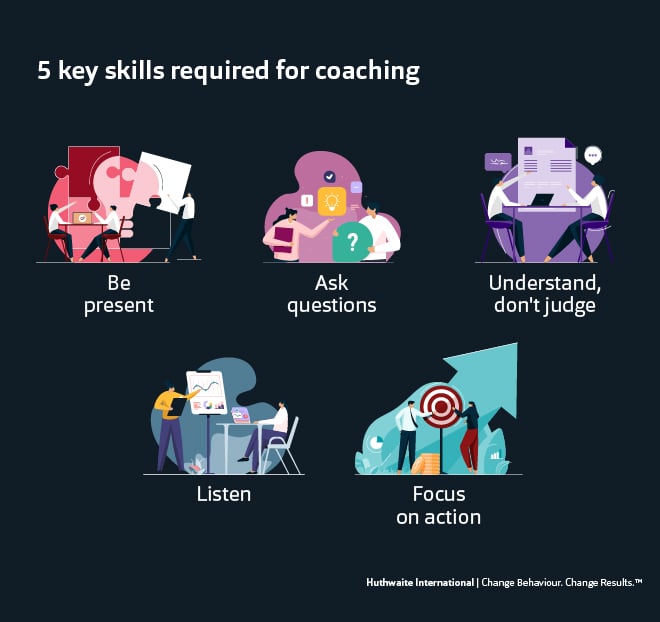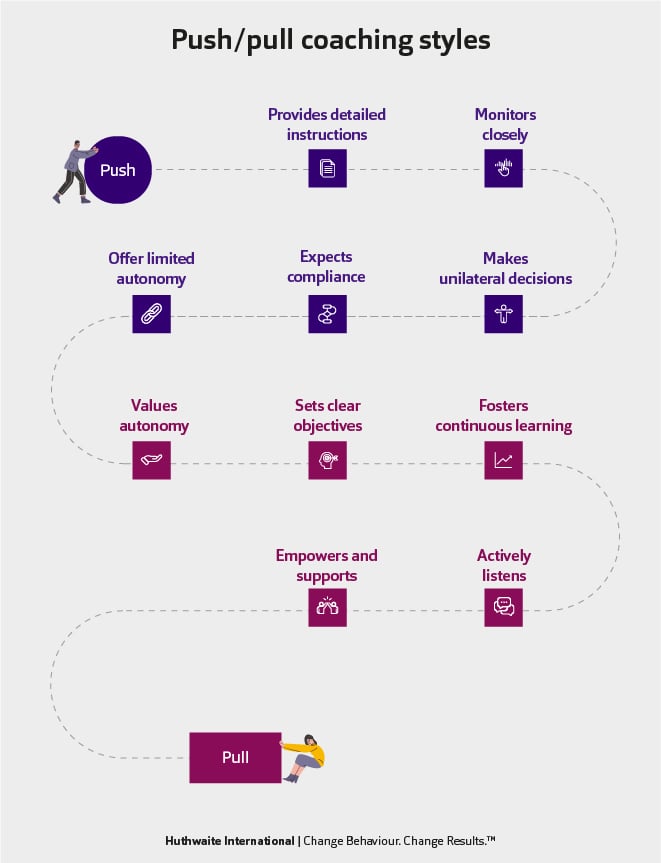At Huthwaite International, we have done vast research into the behaviours that make someone effective in a particular role.
We know, for example, that the behaviours required to be a successful sales person differ from those required to be a successful manager.
The same is true of coaching. Huthwaite International’s research has identified five golden rules of effective coaching. Head of Thought Leadership, Dr Janet Curran, shares the key findings.
In this blog, we'll cover the top 5 coaching techniques, including what they are and how to use them.
 1. Be present in the room
1. Be present in the room
In today’s busy, pressurised world, it’s so easy to be distracted. People are used to being instantly available and contactable. But when coaching, it’s essential to put distractions aside and focus on the other person.
The quality of 'attention' given by the coach makes all the difference and helps to build a trusting relationship. So, when coaching, switch off the mobile phone, put all other thoughts out of your head and be present for your coachee.
2. Ask questions
Generally speaking, a 'pull' style of coaching, where the coach asks more questions instead of providing information, is more effective.
The only time where this may be different is when the coach has knowledge that the coachee doesn’t have.
On these occasions, it’s acceptable to share the knowledge – provided it’s relevant, credible and provides a different perspective or reframing of the situation for the coachee to consider.
For example, Huthwaite International offers a SPIN selling refresher course, in which attendees can refine their SPIN sales knowledge and improve their selling techniques.
In this case, the participants have a pre-existing understanding of the core principles of SPIN selling, therefore, some elements of the course can lend themselves to a question-led approach to gauge which areas the attendee needs to improve on.

3. Seek to understand, not judge
It’s important to seek to understand the other person, rather than judge them. Behaviour that implies a judgement from the coach is not usually effective.
Giving negative feedback, such as “You didn’t do that well”, is one such example. Much better to ask more probing questions, even using the word ‘Why’. The key to using ‘Why’ effectively lies in the way that it is asked.
When children ask ‘Why?’, we see them as being curious. Coming from adults, especially adults in authority, it can be seen as judgemental; the person on the receiving end feels that they need to justify themselves.
But curiosity is a key attribute for a coach, as indeed it is also essential for a salesperson. Stay with the not knowing is an oft-quoted adage in coaching. The deeper you understand a person, the more likely you are to help them change their behaviour.
This is particularly important in personal development training, in which you need to be inquisitive to fully understand the participant and provide them with the support they need to perform to their optimum potential.
4. Listen
There’s no point asking questions if you don’t listen to the answers. And the quality of listening is absolutely key in coaching. You need to be able to listen to the whole person and not just the surface-level noise.
You also don’t need to hang on to every single word. Good coaches know to listen out for those “ooh” moments; the one phrase from the coachee that really strikes you. Listening to the first 100 words will also give you clues as to what is top of the brain for the coachee right now.
Listening is the key to effective communication, with active listening fostering relationships based on transparency and honesty. It’s a soft skill that’s a key contributor to successful coaching, whether you’re focusing on sales, negotiations, or otherwise.
5. Focus on action
Effective coaching is about raising the coachee’s awareness of themselves and their behaviour and enabling them to take responsibility for change (Whitmore, 2002).
Our research has found that the most effective coaching sessions contain more proposals for action and that the majority of those proposals come from the coachee. This means that there’s less information exchange and less feedback. Good coaches do a lot of seeking from the coachee, encouraging them to come up with ideas.
In summary, effective coaching is about focusing on the coachee, building a trusting relationship through demonstrating attention to their needs, seeking to understand them rather than judge, listening to what they say, and encouraging them to come up with ideas on how to move forward.
how to set up a coaching project that produces real and lasting performance improvements
how to measure the impact and communicate the success of coaching.








